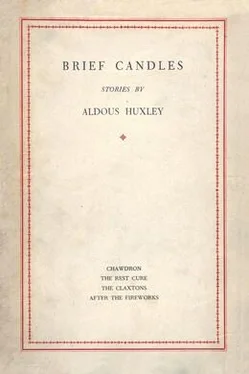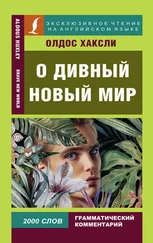Олдос Хаксли - Brief Candles. Four Stories
Здесь есть возможность читать онлайн «Олдос Хаксли - Brief Candles. Four Stories» весь текст электронной книги совершенно бесплатно (целиком полную версию без сокращений). В некоторых случаях можно слушать аудио, скачать через торрент в формате fb2 и присутствует краткое содержание. Год выпуска: 2017, Издательство: epubBooks Classics, Жанр: Классическая проза, на английском языке. Описание произведения, (предисловие) а так же отзывы посетителей доступны на портале библиотеки ЛибКат.
- Название:Brief Candles. Four Stories
- Автор:
- Издательство:epubBooks Classics
- Жанр:
- Год:2017
- ISBN:нет данных
- Рейтинг книги:4 / 5. Голосов: 1
-
Избранное:Добавить в избранное
- Отзывы:
-
Ваша оценка:
- 80
- 1
- 2
- 3
- 4
- 5
Brief Candles. Four Stories: краткое содержание, описание и аннотация
Предлагаем к чтению аннотацию, описание, краткое содержание или предисловие (зависит от того, что написал сам автор книги «Brief Candles. Four Stories»). Если вы не нашли необходимую информацию о книге — напишите в комментариях, мы постараемся отыскать её.
Brief Candles. Four Stories — читать онлайн бесплатно полную книгу (весь текст) целиком
Ниже представлен текст книги, разбитый по страницам. Система сохранения места последней прочитанной страницы, позволяет с удобством читать онлайн бесплатно книгу «Brief Candles. Four Stories», без необходимости каждый раз заново искать на чём Вы остановились. Поставьте закладку, и сможете в любой момент перейти на страницу, на которой закончили чтение.
Интервал:
Закладка:
‘What indeed!’
‘I must say, I admired Charlotte that evening,’ he went on. ‘She knew so exactly the line to take with Chawdron; which was the more surprising as with me she’s never quite pulled it off. She tries the siren on me, very dashing and at the same time extremely mysterious. Her line is to answer my most ordinary remarks with something absolutely incomprehensible, but obviously very significant. If I ask her, for example: “Are you going to the Derby this year?” she’ll smile a really Etruscan smile and answer: “No, I’m too busy watching the boat–race in my own heart.” Well, then, obviously it’s my cue to be terribly intrigued. “Fascinating Sphinx,” I ought to say, “tell me more about your visceral boat–race,” or words to that effect. Whereupon it would almost certainly turn out that I was rowing stroke in the winning boat. But I’m afraid I can’t bring myself to do what’s expected of me. I just say: “What a pity! I was making up a party to go to Epsom”—and hastily walk away. No doubt, if she was less blackly Semitic I’d be passionately interested in her boat–race. But as it is, her manoeuvre doesn’t come off. She hasn’t yet been able to think of a better one. With Chawdron, however, she discovered the correct strategy from the first moment. No siren, no mystery for him. His heart was too golden and hog–washy for that. Besides, he was fifty. It’s the age when clergymen first begin to be preoccupied with the underclothing of little schoolgirls in trains, the age when eminent archaeologists start taking a really passionate interest in the Scout movement. Under Chawdron’s criminal mask Charlotte detected the pig–like angel, the sentimental Pickwickian child–lover with a taste for the détournement de mineurs . Charlotte’s a practical woman: a child was needed, she immediately became the child. And what a child! I’ve never seen anything like it. Such prattling! Such innocent big eyes! Such merry, merry laughter! Such a wonderfully ingenuous way of saying extremely risqué things without knowing (sweet innocent) what they meant! I looked on and listened—staggered. Horrified too. The performance was really frightful. Suffer little children … But when the little child’s twenty–eight and tough for her age—ah, no; of such is the kingdom of hell. For me, at any rate. But Chawdron was enchanted. Really did seem to imagine he’d got hold of something below the age of consent. I looked at him in amazement. Was it possible he should be taken in? The acting was so bad, so incredibly unconvincing. Sarah Bernhardt at seventy playing L’Aiglon looked more genuinely like a child than our tough little Charlotte. But Chawdron didn’t see it. This man who had lived by his wits, and not merely lived, but made a gigantic fortune by them:—was it possible that the most brilliant financier of the age should be so fabulously stupid? “Youth’s infectious,” he said to me after dinner, when the women had gone out. And then—you should have seen the smile on his face: beatific, lubrically tender—“She’s like a jolly little kitten, don’t you think?” But what I thought of was the New Guinea Oil Company. How was it possible? And then suddenly I perceived that it wasn’t merely possible; it was absolutely necessary. Just because he’d made fourteen hundred thousand pounds out of the New Guinea Oil scandal, it was inevitable that he should mistake a jolly little tarantula like Charlotte for a jolly little kitten. Inevitable. Just as it was inevitable that I should be bowled over by every bitch that came my way. Chawdron had spent his life thinking of oil and stock markets and flotations. I’d spent mine reading the Best that has been Thought or Said. Neither of us had had the time or energy to live—completely and intensely live, as a human being ought to, on every plane of existence. So he was taken in by the pseudo–kitten, while I succumbed to the only too genuine bitch. Succumbed, what was worse, with full knowledge. For I was never really taken in. I always knew that the bitches were bitches and not milk–white hinds. And now I also know why I was captivated by them. But that, of course, didn’t prevent me from continuing to be captivated by them. Experientia doesn’t, in spite of Mrs Micawber’s Papa. Nor does knowledge.’ He paused to relight his pipe.
‘What does, then?’ I asked.
Tilney shrugged his shoulders. ‘Nothing does, once you’ve gone off the normal instinctive rails.’
‘I wonder if they really exist, those rails?’
‘So do I, sometimes,’ he confessed. ‘But I piously believe.’
‘Rousseau and Shelley piously believed too. But has anybody ever seen a Natural Man? Those Noble Savages … Read Malinowsky about them; read Frazer; read … ’
‘Oh, I have, I have. And of course the savage isn’t noble. Primitives are horrible. I know. But then the Natural Man isn’t Primitive Man. He isn’t the raw material of humanity; he’s the finished product. The Natural Man is a manufactured article—no, not manufactured; rather, a work of art. What’s wrong with people like Chawdron is that they’re such bad works of art. Unnatural because inartistic. Ary Scheffer instead of Manet. But with this difference. An Ary Scheffer is statically bad; it doesn’t get worse with the passage of time. Whereas an inartistic human being degenerates, dynamically. Once he’s started badly, he becomes more and more inartistic. It needs a moral earthquake to arrest the process. Mere fleabites, like experience or knowledge, are quite unavailing. Experientia doesn’t. If it did, I should never have succumbed as I did, never have got into financial straits, and therefore never have written Chawdron’s autobiography, never have had an opportunity for collecting the intimate and discreditable materials for the biography that, alas, I shall never write. No, no; experience didn’t save me from falling a victim yet once more. And to such a ruinously expensive specimen. Not that she was mercenary,’ he put in parenthetically. ‘She was too well off to need to be. So well off, however, that the mere cost of feeding and amusing her in the style she was accustomed to being fed and amused in was utterly beyond my means. Of course she never realized it. People who are born with more than five thousand a year can’t be expected to realize. She’d have been terribly upset if she had; for she had a heart of gold—like all the rest of us.’ He laughed mournfully. ‘Poor Sybil! I expect you remember her.’
The name evoked for me a pale–eyed, pale–haired ghost. ‘What an astonishingly lovely creature she was!’
‘Was, was,’ he echoed. ‘ Fuit. Lovely and fatal. The agonies she made me suffer! But she was as fatal to herself as to other people. Poor Sybil! I could cry when I think of that inevitable course of hers, that predestined trajectory.’ With a stretched forefinger he traced in the air a curve that rose and fell away again. ‘She had just passed the crest when I knew her. The descending branch of the curve was horribly steep. What depths awaited her! That horrible little East–Side Jew she even went to the trouble of marrying! And after the Jew, the Mexican Indian. And meanwhile a little champagne had become rather a lot of champagne, rather a lot of brandy; and the occasional Good Times came to be incessant, a necessity, but so boring, such a dismal routine, so terribly exhausting. I didn’t see her for four years after our final quarrel; and then (you’ve no idea how painful it was) I suddenly found myself shaking hands with a Memento Mori. So worn and ill and tired, so terribly old. Old at thirty–four. And the last time I’d seen her, she’d been radiant. Eighteen months later she was dead; but not before the Indian had given place to a Chinaman and the brandy to cocaine. It was all inevitable, of course, all perfectly foreseeable. Nemesis had functioned with exemplary regularity. Which only made it worse. Nemesis is all right for strangers and casual acquaintances. But for oneself, for the people one likes—ah, no! We ought to be allowed to sow without reaping. But we mayn’t. I sowed books and reaped Sybil. Sybil sowed me (not to mention the others) and reaped Mexicans, cocaine, death. Inevitable, but an outrage, an insulting denial of one’s uniqueness and difference. Whereas when people like Chawdron sow New Guinea Oil and reap kittenish Charlottes, one’s delighted; the punctuality of fate seems admirable.’
Читать дальшеИнтервал:
Закладка:
Похожие книги на «Brief Candles. Four Stories»
Представляем Вашему вниманию похожие книги на «Brief Candles. Four Stories» списком для выбора. Мы отобрали схожую по названию и смыслу литературу в надежде предоставить читателям больше вариантов отыскать новые, интересные, ещё непрочитанные произведения.
Обсуждение, отзывы о книге «Brief Candles. Four Stories» и просто собственные мнения читателей. Оставьте ваши комментарии, напишите, что Вы думаете о произведении, его смысле или главных героях. Укажите что конкретно понравилось, а что нет, и почему Вы так считаете.



![Олдос Хаксли - О дивный новый мир [Прекрасный новый мир]](/books/11834/oldos-haksli-o-divnyj-novyj-mir-prekrasnyj-novyj-thumb.webp)






